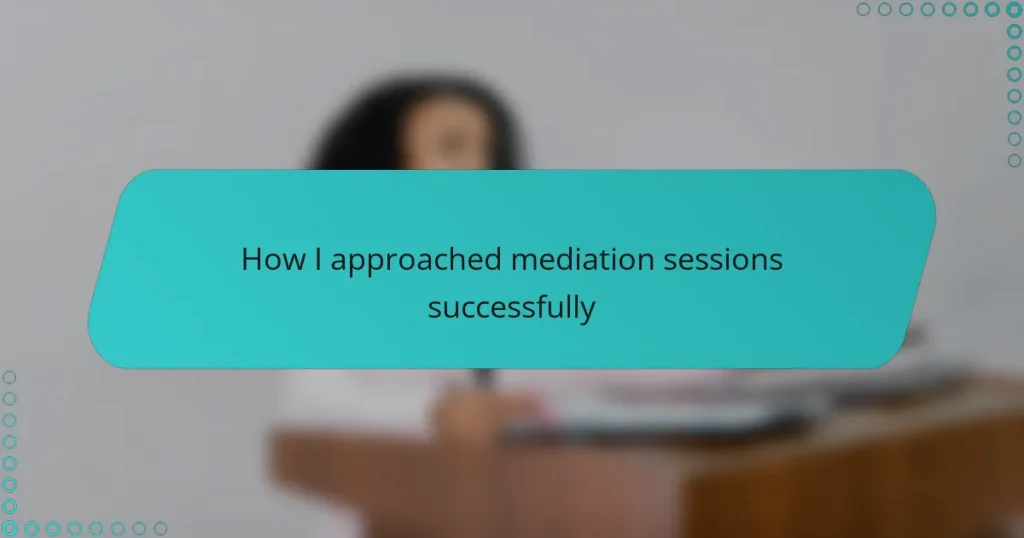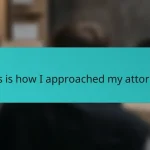Key takeaways
- Mediation is about collaborative problem-solving, focusing on understanding rather than defeating the other side.
- Preparation involves understanding client perspectives, setting realistic goals, and mentally rehearsing the session to foster effective communication.
- Active listening and managing expectations are crucial strategies for successful mediation, allowing for flexibility and uncovering underlying interests.
- Effective communication relies on clarity, open-ended questions, and nonverbal cues to build trust and keep dialogue constructive.
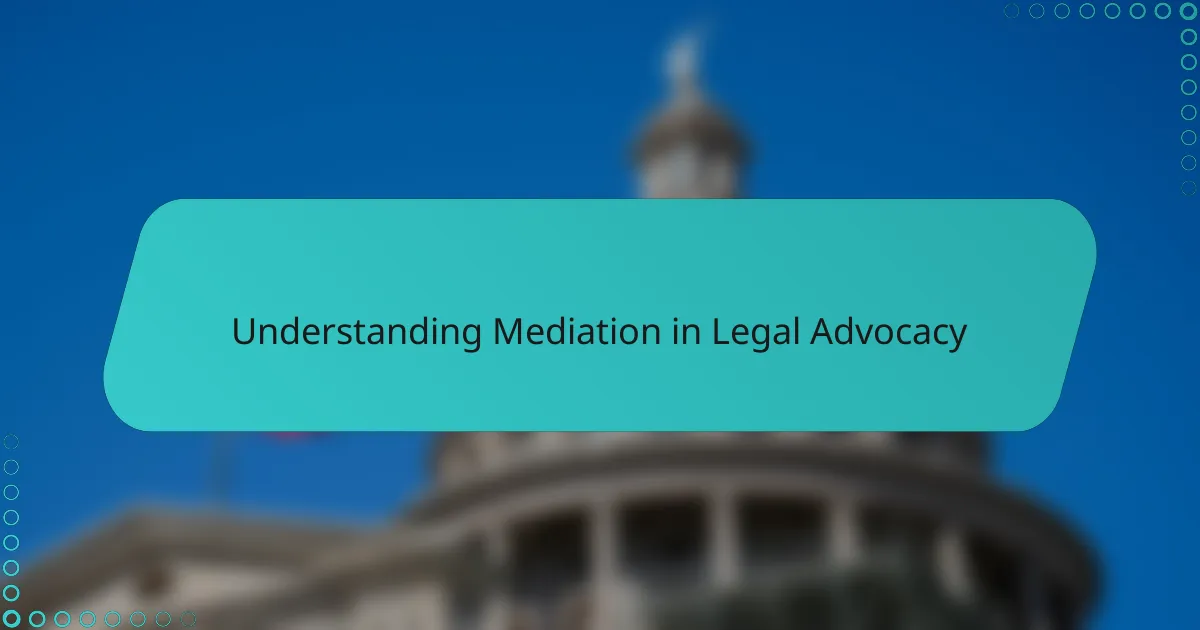
Understanding mediation in legal advocacy
Mediation, in the context of legal advocacy, is more than just a step in dispute resolution; it’s a unique opportunity to bridge gaps through dialogue rather than confrontation. I’ve often found that approaching mediation with an open mind and genuine willingness to listen transforms what could be tense sessions into collaborative problem-solving. Isn’t it intriguing how simply shifting focus from winning to understanding can change the entire dynamic?
When I first entered mediation, I underestimated how emotional the process could be. Legal arguments aside, I encountered real human stories, fears, and hopes that influenced every negotiation. This insight taught me that successful advocacy means recognizing the person behind the legal stance and finding common ground beyond the paperwork.
Understanding mediation also means appreciating its purpose: it’s not about defeating the other side but achieving a sustainable resolution that respects everyone’s interests. Have you noticed how mediation requires patience and empathy in ways traditional litigation may not? From my experience, embracing these qualities has been crucial to guiding clients through mediation with confidence and respect.
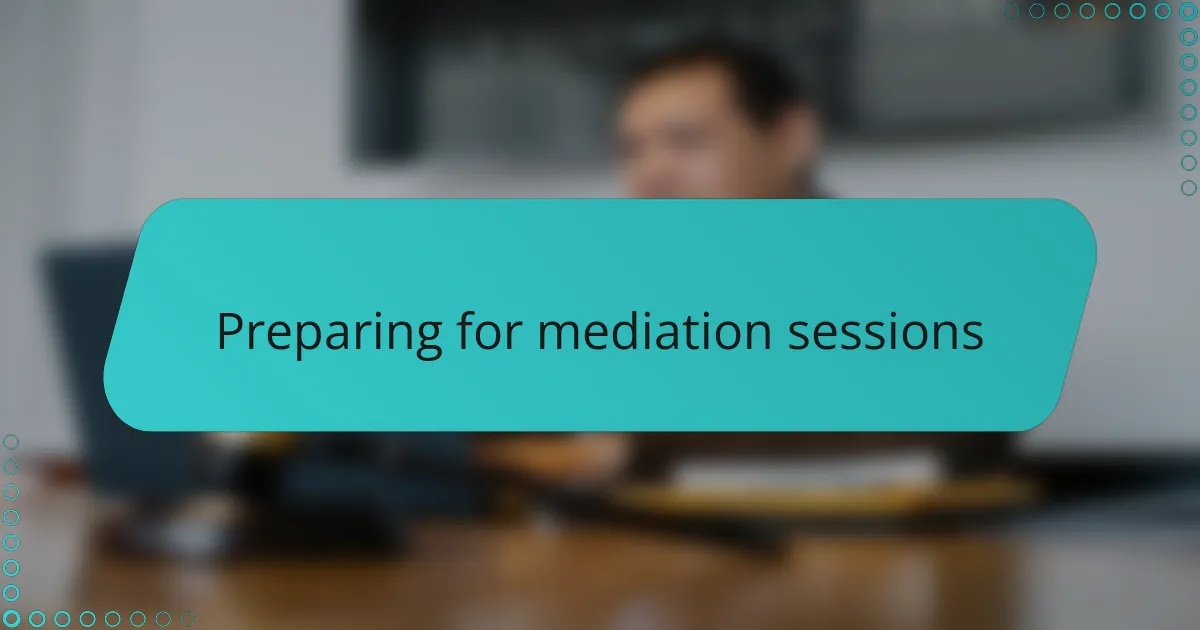
Preparing for mediation sessions
Preparing for mediation sessions, in my experience, starts long before you step into the room. I always take time to thoroughly review all relevant documents and understand the core issues from my client’s perspective. Have you ever noticed how being well-prepared reduces anxiety and opens the door to clearer communication?
Another key step I focus on is setting realistic goals—not just for the outcome but for the tone of the session. I remind myself that mediation is about collaboration, so I encourage clients to consider what they truly need versus what they want. This mindset shift has made a significant difference in reaching agreements that hold over time.
Lastly, I find it invaluable to mentally rehearse the session, anticipating potential emotions and reactions. Sometimes, I even visualize stepping back and listening attentively instead of responding immediately. Has that ever happened to you, where pausing for a moment changed the whole direction of the conversation? For me, this tactic has diffused tension and fostered mutual respect more than once.
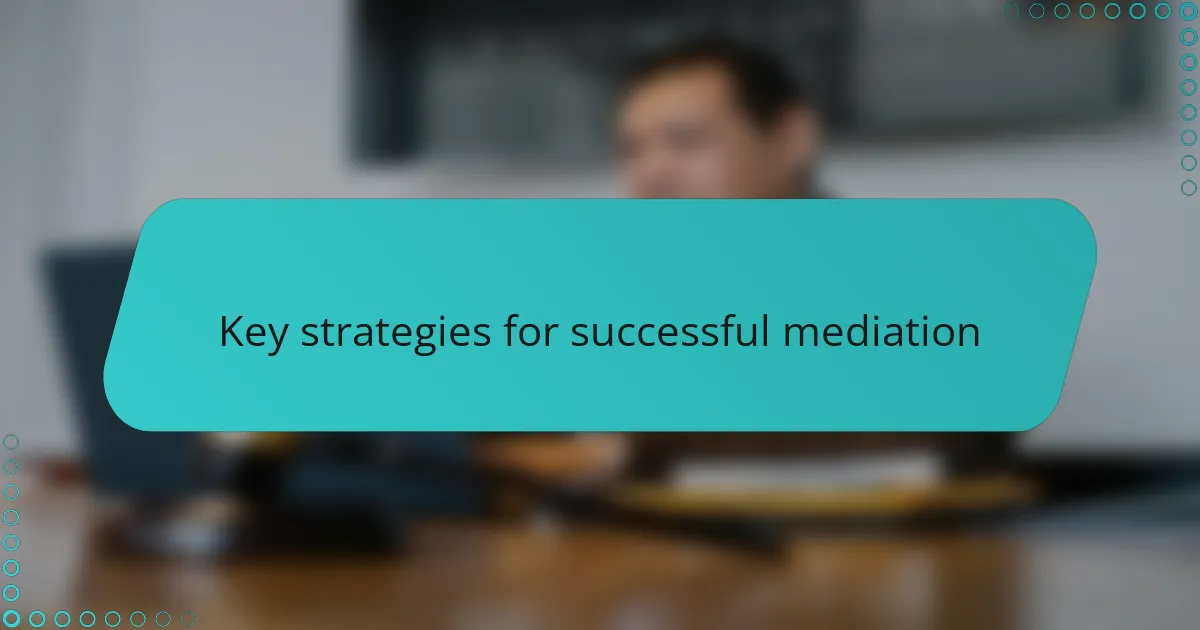
Key strategies for successful mediation
One strategy I’ve come to trust is focusing on active listening. Instead of preparing just to speak, I prepare to truly hear what the other side is saying, which often reveals underlying interests that aren’t immediately obvious. Have you ever caught yourself waiting to respond rather than absorbing what’s being shared? Shifting that habit changed everything for me in mediation.
Another approach that’s helped me consistently is managing expectations—not only my clients’ but my own. It’s tempting to push for a perfect outcome, but I’ve learned that flexibility opens doors to solutions that were otherwise invisible. When you accept that mediation is a process, not an instant fix, the pressure eases and collaboration naturally improves.
Lastly, maintaining emotional control during sessions has proven vital. I remember one mediation where tensions escalated quickly, yet by taking a deep breath and acknowledging the emotions in the room, I was able to guide the conversation back to constructive ground. Isn’t it surprising how a calm presence can reset a heated dialogue? This calmness often paves the way for breakthroughs I hadn’t anticipated.
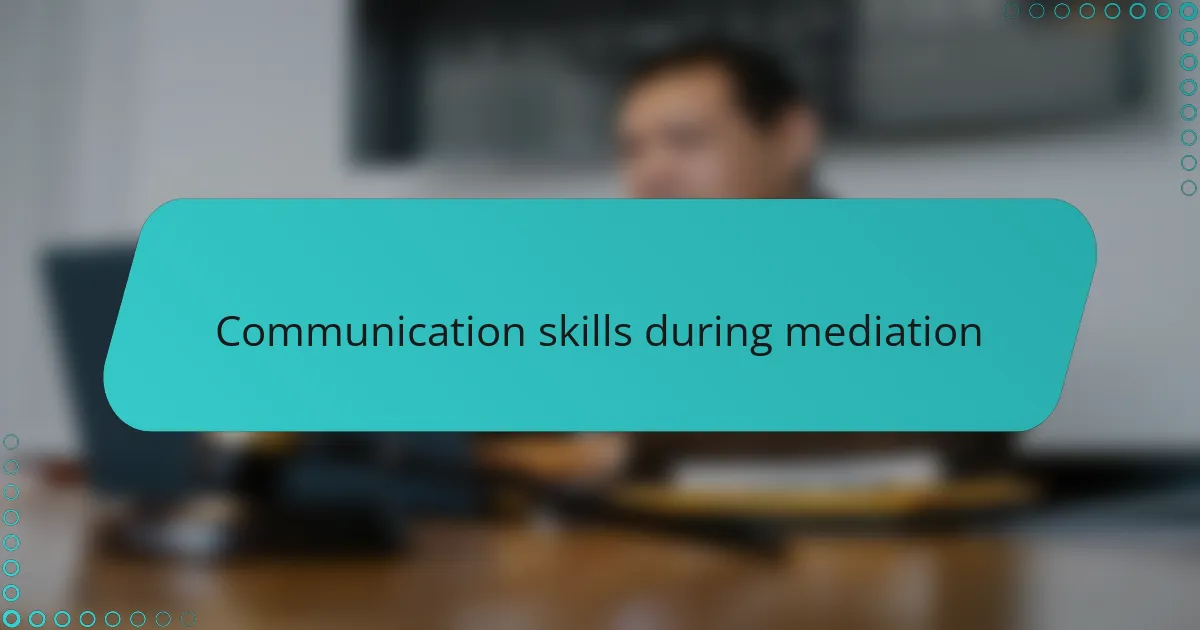
Communication skills during mediation
When it comes to communication during mediation, I’ve realized that clarity is everything. It’s not just about what you say, but how you say it—using simple, respectful language helps prevent misunderstandings and keeps the conversation productive. Have you noticed how a well-chosen word or a calm tone can instantly lower the room’s tension?
I’ve also found that asking open-ended questions can be surprisingly powerful. Rather than making assumptions, these questions invite the other side to share their true concerns and priorities, which often uncovers common ground. Once, by simply asking “What matters most to you here?” the entire mediation shifted from confrontation to collaboration.
Lastly, I can’t stress enough the value of nonverbal cues. I pay close attention to body language—both mine and others’—because pauses, eye contact, and posture often communicate more than words. Have you ever caught yourself nodding or leaning in, which made the other person more willing to open up? These subtle signals have helped me build trust and keep dialogue flowing smoothly.
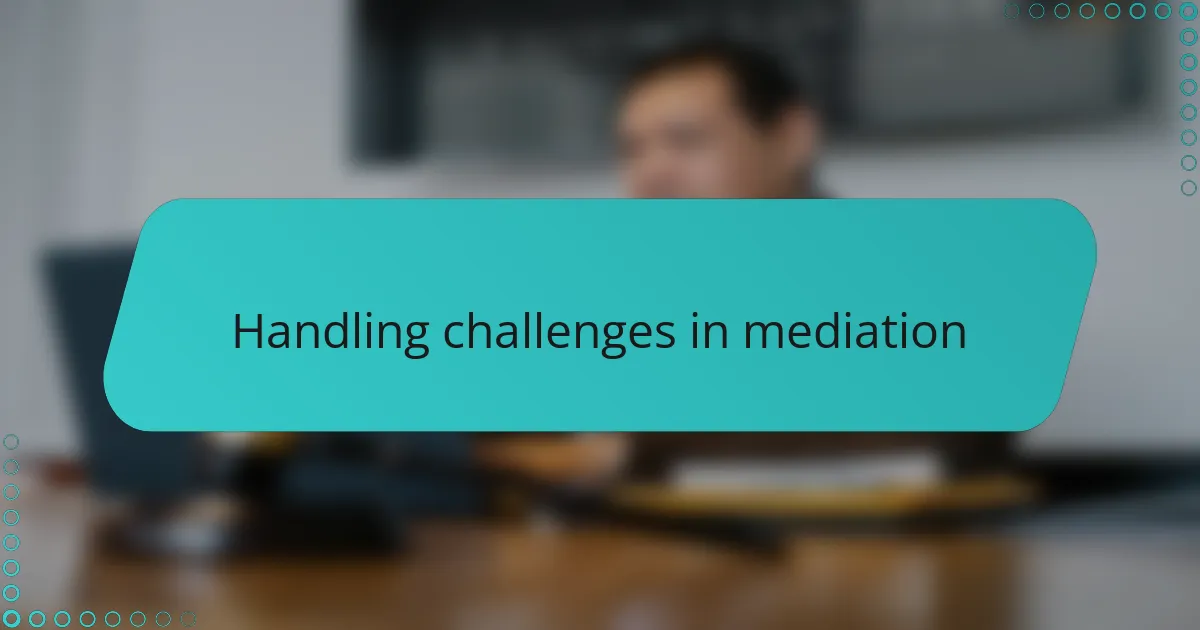
Handling challenges in mediation
Challenges in mediation often come disguised as moments of frustration or silence. I remember one session where progress stalled because emotions ran high—pausing to acknowledge the tension instead of pushing past it changed the entire atmosphere. Have you ever noticed how simply naming the difficulty can open the door to renewed dialogue?
Dealing with stubbornness or deadlock requires patience, but also creativity. Sometimes I tried proposing unexpected compromises or reframing the issues to reveal new paths forward. It’s fascinating how a small shift in perspective can turn resistance into cooperation.
At times, managing my own reactions was the toughest part. When disagreements became personal, I reminded myself that staying calm wasn’t just for my benefit but also a signal to everyone that resolution was still possible. Isn’t it interesting how one person’s composure can influence the whole room’s temperament?
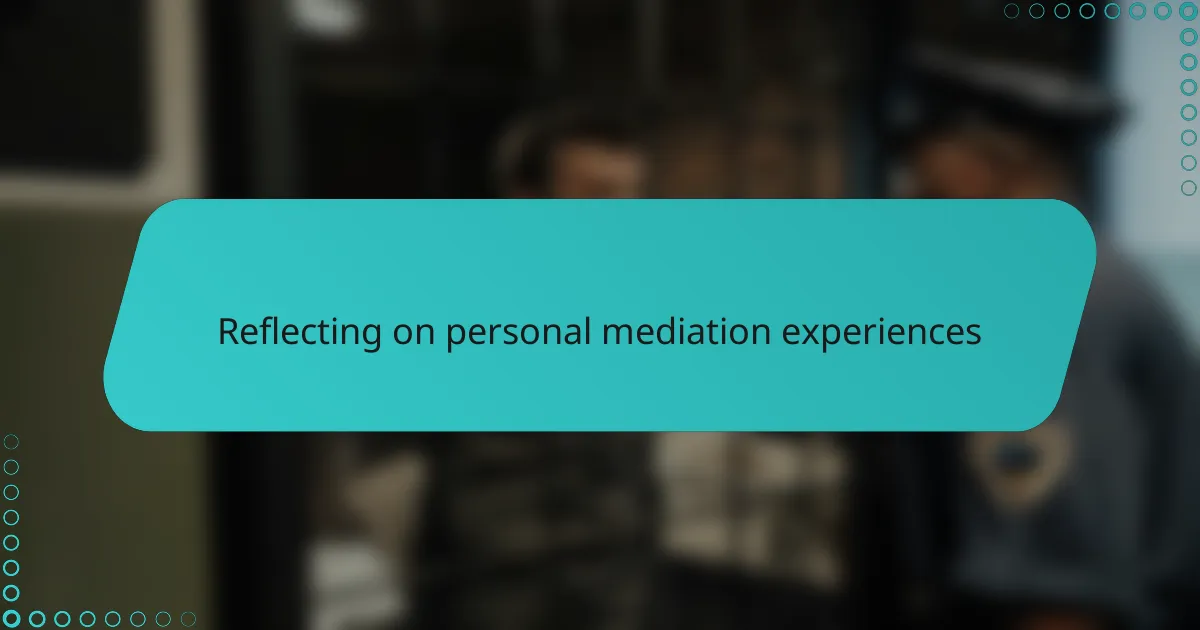
Reflecting on personal mediation experiences
Looking back on my mediation experiences, I realize how much they taught me about patience and humility. There was one case where, despite my careful preparation, I had to pause and reassess my approach when emotions unexpectedly surged. Have you ever had a moment when the best strategy was simply to listen and let others speak their truth?
What struck me most during these sessions was how often breakthroughs came after moments of vulnerability—when everyone dropped their guarded stances. I remember feeling a surprising sense of connection that shifted the whole dynamic. Does that not remind us that beneath the legal issues, mediation is ultimately human?
Reflecting now, I see that success in mediation wasn’t just about legal skill but about emotional intelligence. I learned to balance advocacy with empathy, which often meant setting aside my own agenda to understand the hopes and fears driving each party. Isn’t it fascinating how that understanding can open doors that facts alone never could?
